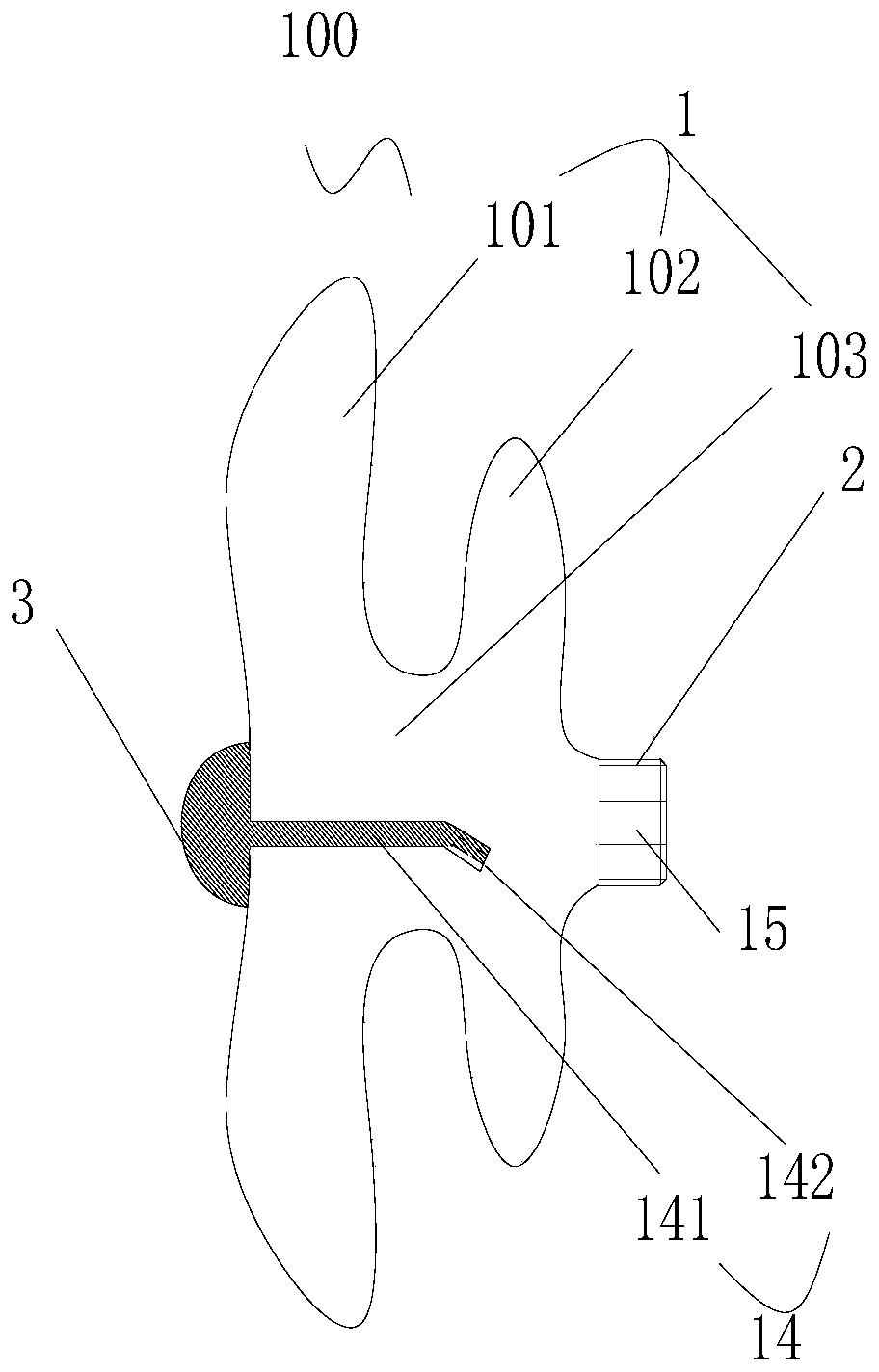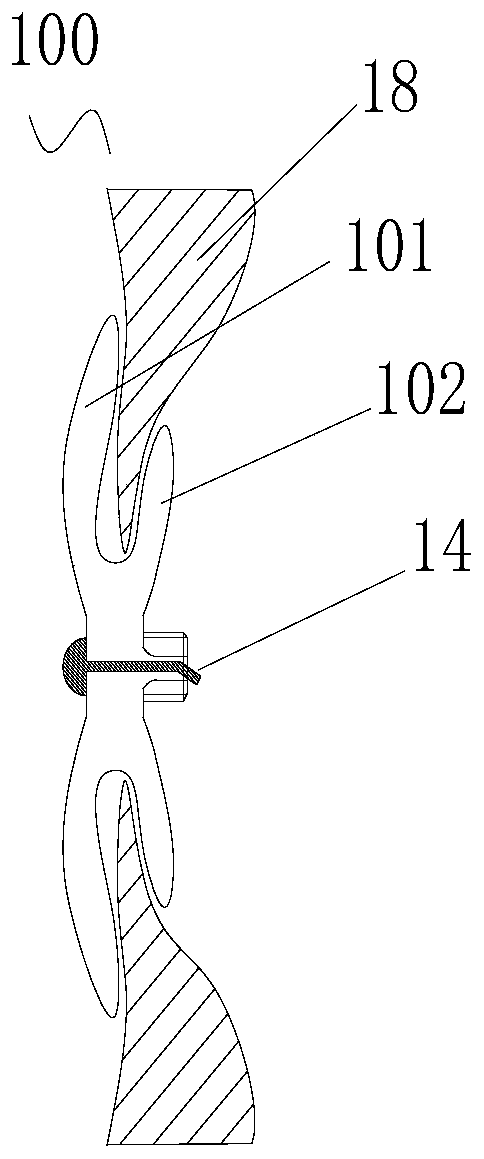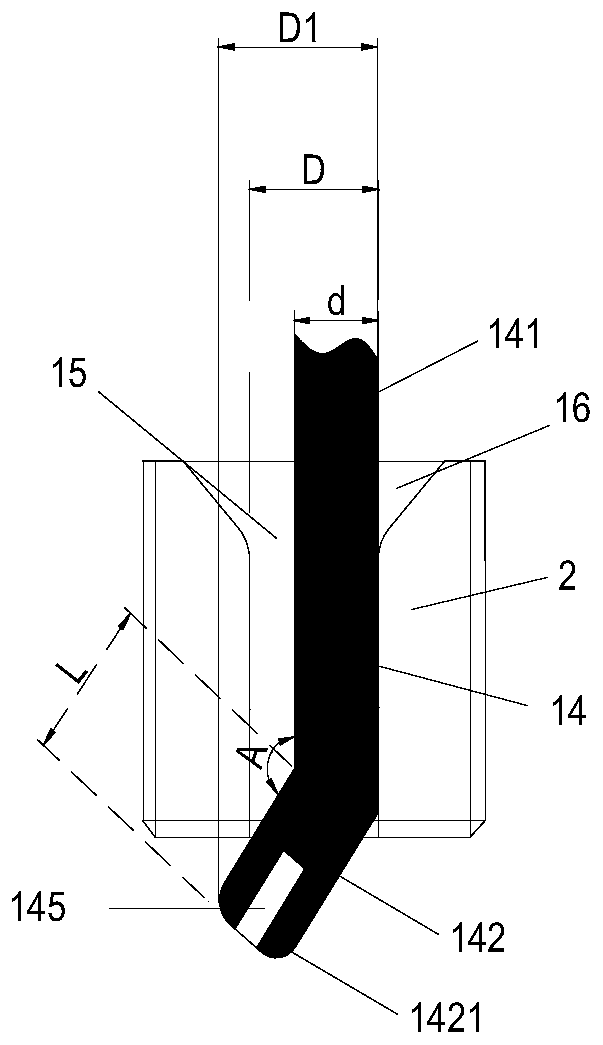Occluders and Closure Devices
An occluder and proximal technology, applied in medical science, surgery, etc., can solve the problems of insufficient contraction force of the occlusion unit, memory metal fatigue failure, low elasticity of polymer materials, etc., and achieve simplified preparation process and locking operation, The effect of not easy to fail and easy to control the size
- Summary
- Abstract
- Description
- Claims
- Application Information
AI Technical Summary
Problems solved by technology
Method used
Image
Examples
Embodiment 1
[0041] see figure 1 , the occluder 100 includes a reticular occluder body 1 with a cavity 103, a proximal plug head 2 and a distal end cap 3, the proximal plug head 2 is fixedly connected to the proximal end of the occluder body 1, and the distal end cap 3 is fixedly connected to the distal end of the blocking body 1 . The blocking body 1 includes two disk-shaped first blocking units 101 and second blocking units 102, and the two blocking units 101 and 102 are connected to form an "I" shape. The occluder 100 also includes a locking member 14 located in the cavity 103 . The distal end of the locking member 14 is connected with the distal end of the blocking body 1 . The proximal plug head 2 has a locking hole 15 that communicates with the cavity 103 . Preferably, the locking hole 15 is arranged coaxially with the proximal bolt head 2 .
[0042] It can be understood that the structure of the sealing body 1 is only used as an example, and is not a limitation of the present inve...
Embodiment 2
[0065] see Figure 5 , Another embodiment of the present invention also provides an occluder 100a, the occluder 100a is substantially the same as the occluder 100 provided in the first embodiment, the difference is that in this embodiment, the locking of the occluder 100a The piece 14a includes a connecting portion 141a, a first bending portion 142a and a second bending portion 143a. Wherein, the proximal end of the connecting portion 141a is connected to the distal end of the first bending portion 142a, and the proximal end of the first bending portion 142a is connected to the distal end of the second bending portion 143a.
[0066] Please also refer to Figure 6 There is a first bending angle A1 between the first bending portion 142a and the connecting portion 141a, and a second bending angle A2 between the first bending portion 142a and the second bending portion 143a. Preferably, the first bending angle A1 is the same as the second bending angle A2, the purpose of which i...
Embodiment 3
[0071] Such as Figure 7 As shown, another embodiment of the present invention also provides an occluder 300b. Taking the occluder provided in Embodiment 2 as an example, the occluder 300b in this embodiment includes an occluder 100b, at least a distal opening The hollow conveying mechanism 200b, the lock sleeve 6b used to connect the conveying mechanism 200b and the occluder 100b, and the movable pulling member 4b accommodated in the conveying mechanism 200b. The distal end of the traction member 4b runs through the distal end of the delivery mechanism 200b and can be detachably connected to the proximal end of the locking member 14b in the cavity; the traction member 4b can be pulled under the action of an external force towards the proximal end applied by the operator such as a doctor The locking member 14b drives the distal end of the occluder 100b to move proximally until the proximal end of the locking member 14b passes through the locking hole 15b and presses against th...
PUM
 Login to View More
Login to View More Abstract
Description
Claims
Application Information
 Login to View More
Login to View More - R&D
- Intellectual Property
- Life Sciences
- Materials
- Tech Scout
- Unparalleled Data Quality
- Higher Quality Content
- 60% Fewer Hallucinations
Browse by: Latest US Patents, China's latest patents, Technical Efficacy Thesaurus, Application Domain, Technology Topic, Popular Technical Reports.
© 2025 PatSnap. All rights reserved.Legal|Privacy policy|Modern Slavery Act Transparency Statement|Sitemap|About US| Contact US: help@patsnap.com



